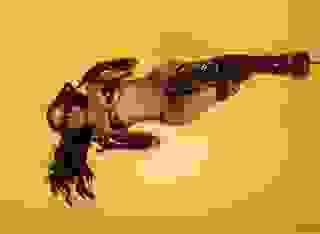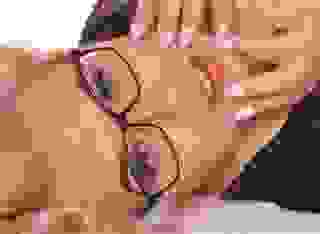- Sci-Fi & Fantasy
- The Un-coyote
Note: You can change font size, font face, and turn on dark mode by clicking the "A" icon tab in the Story Info Box.
You can temporarily switch back to a Classic Literotica® experience during our ongoing public Beta testing. Please consider leaving feedback on issues you experience or suggest improvements.
Click hereForeword -- This is not, nor should it be construed to be, a political commentary. It is only a look at one possible future out of many. While parts of the story are based upon facts, the remainder is only conjecture of how the current political situation in the world might develop and the resultant consequences of that development to the individuals involved.
"Como estas? Puedes continuar o necesitas descansar?"
Those were Maria's words to the six people, two women and four men, we were leading through the desert. This group was our second that month since there were two new moons, and things were going well. Once we reached the border, we'd have to talk in whispers, but the border patrol never came this far out so there was nobody else around to hear me.
"You can speak English", said the woman on my right. We all speak English and we're doing fine. How much farther to the border?"
"About three miles, but it's gonna get too hot to be outside pretty quick now. We'll spend the day in a cave about two miles from here and then go on once the sun goes down. They won't start their air patrols again before the sun comes up because the batteries in their solar powered ultralights don't last very long without sunshine. By that time, we'll be across the border."
My cave had served me well on many such trips across the border. It was impossible to spot from the air because of the rock that hung over the entrance. From the ground it was hard to spot too because the entrance was through a sort of maze of cactus and large rocks. I only knew about it because it was on what had once been my grandpa's vineyard about fifty miles from Chula Vista.
It was large enough to house at least thirty people, but we never took that many. It was too risky to get that much food and water to the cave. It would also have been too easy for more than twelve to get separated, and we couldn't afford to waste time trying to find them.
It would have taken a week or more to haul enough supplies for more people and would have required help and some sort of transportation. Since internal combustion engines had been outlawed in Sacrevista for over ten years, that meant other people, electric vehicles or burros. Other people helping us would have been a potential security leak. An electric vehicle didn't have the range required. Burros were noisy and they required feed and water. Maria and I could pack enough food and water to the cave for a dozen by ourselves the night before the new moon
We got to my cave and everybody got something to eat and drink. They went to sleep while I turned on the radar scanner and looked at the screen for a few minutes.
My radar dish sits on a ledge above the cave in a fiberglass enclosure that looks like a big rock. As soon as I turned it on, the dish began scanning a little more than three fourths of the area in front of the cave. The other fourth was the solid rock behind it. There was nothing abnormal out there within the twenty mile range of the scanner, so I had a couple of hours to sleep. Maria and I would alternate sleep periods so if anybody got closer than twenty miles, one would wake the other.
That night, after another meal and a long drink, we started the twelve escapees toward the border again. About one AM and a half a mile from my planned crossing point, I motioned for them to stop.
"We're about a half a mile away. We might have to run for a while. Does anybody need to rest again?"
I knew the answer before I asked. All of them were so excited they'd have run all the way from my cave if I'd asked them to. They all shook their heads and grinned. One of the men asked how many guards we'd find and if they'd chase us or not. I smiled back.
"All the guards except one will be back at the guard station and asleep. They'll change guards in about another hour, but the one walking the post will be pretty sleepy by now. He'll probably be more worried about staying awake than watching for anybody crossing."
I touched the night vision goggles on my head.
"I'll be able to see him before he can see us and we'll just walk around him. Everybody has to be quiet though or he might hear us."
The man standing by my right shoulder tugged at my sleeve. He looked worried.
"If they do see us, will they shoot at us?"
I had to grin.
"They won't see us if everybody's quiet. Even if they hear something, they'll just think it's a coyote. They don't carry any ammunition for their guns anyway. All they carry is a can of pepper spray in case they get attacked. They'd have to go back to their guard station and get ammunition and permission to shoot at anything. We'll be long gone before they can do that."
I found the guard fifteen minutes later. He was sitting on a rock and his head was nodding like he was almost asleep. I motioned for the group to fall in behind me with their left hand on the shoulder in front of them, and led them away from the guard's position. Maria brought up the rear to make sure nobody got left behind.
Half an hour later, we crossed the border into North Mexico and their new home. After walking another half an hour, the North Mexico Immigration bus returned the quick blink of my flashlight with a double blink of its headlights. My six were safe and on their way to a new life of work and prosperity. Maria and I rode with them until the bus reached Rancho. From there we drove to our place in the country for a rest before starting the next trip.
Maria and I got home about half an hour later, and while we were undressing she asked when we'd be taking the next group out.
"It'll be another month. Juan had some sort of trouble getting them ready. Why?"
Maria stretched seductively and then scratched under her breasts as she smiled.
"You know what nights like tonight do to me. I get all excited and it doesn't go away for a while. If we have that long, you'll have time to get me all settled back down again...if you start right now."
I was tired, but not that tired. As Maria slipped out of her panties and climbed into bed, I pulled off my clothes. When she held out her arms, I hopped on the bed and pulled her close. I felt my stiffening cock brush the hair on her mound at the same time she mashed her breasts into my chest.
Maria lifted her thigh over me and pushed her mound down against my cock. She kissed me then, and the feeling of her lips mouthing mine finished raising my cock.
"I'm ready right now", Maria whispered. "Don't make me wait."
I couldn't have waited even if I'd wanted to...well, I would have if she'd needed that, but after a trip, she never did. Maria was always a great lover, but after a trip, she was so aroused it was more like she was making love to me than the other way around. Already I felt her hand on my cock and guiding it between her open thighs.
A while later, after Maria had cried out and took me over the edge with her rocking hips and fingernails that dug into my ass, she sighed.
"I didn't want it to end, but when it did...wow."
I chuckled.
"I know what you mean. Remind me to take you along on the next trip."
Maria stroked my chest.
"I'll remind you, if we can do this again before we go to sleep."
It was always like this, or had been since the night I brought Maria and her mother out of Sacrevista. In my experience, women are aroused by a variety of things, but until Maria, I'd never met a woman who was aroused by danger. It's like something inside her starts getting wound up like a clock spring, and that spring keeps getting tighter and tighter. Once we have the clients safely on the bus and we get home, nothing but sex can unwind that spring. When it does unwind, it's more than I ever even dreamed about.
It probably seems difficult for a reader to understand what I'm talking about and why Maria and I were doing what we were doing. The reasons are many, but all boil down to just simple economics and an experiment in government. I was only ten when it started, so most of what I know I read in my history classes in high school. Like most history, it's probably half true and half the opinions of the scholars on the US side. I'm sure the students in Sacrevista get another version that has been sanitized to agree with Sacrevista politics.
A little after the turn of the century - about 2022 is the date agreed upon by most scholars - the United States was heavily engaged in the second civil war of its history. It wasn't a war fought on a battlefield. It was a war fought mainly in the courtrooms in California and New York, and to a lesser extent in several other states.
The state governments of those states were composed of ultra-liberals who called themselves Democrats and sometimes, Democratic Socialists. The Federal Government was composed of a majority of conservatives who called themselves Republicans and who were in opposition to the ideals of the Democratic Socialists.
The goals of the ultra-liberal leaders of the Democratic Socialists reflected the opinions of the most vocal citizens in the major cities. The ultra-conservative Republican Party reflected the opinions of the most vocal citizens in the more rural areas. Neither party understood their policies didn't reflect the opinions and needs of the population as a whole.
That lack of understanding led to a lot of turmoil in the US. Little by little, those liberal Democratic states passed state laws that reflected their vision of how society should function but seemed to be in direct violation of federal laws and the US Constitution. The conservative Republicans strongly objected to these laws and filed lawsuits to overturn them via the court system. The Democratic states counter-sued.
The same things were happening at the state level too. Just as the ultra-liberal states were at war with the federal government, the more conservative, rural county governments in those states were at war with the liberal state governments elected by the most populous cities. For a while, most legislating was actually done by the judicial system and the outcome was determined by the makeup of the particular court.
Liberal judges tended to interpret the US and state constitutions using the logic and morals of the current time. Their belief was that the US and state constitutions were fluid documents, and because of that belief, they usually sided with the liberal positions. Conservative judges interpreted the federal and state constitutions as written and used other documents from the time those constitutions were written to interpret laws according to the conservative position. Ultimately those lawsuits ended up as proposals for a hearing by the US Supreme Court. Had the court heard every case, it would have taken decades, so only those cases that were the most controversial were actually heard. The rest were postponed pending the decisions on the most controversial.
Usually the left was outraged at the outcomes of those cases that were heard. In response to the Democratic Socialist's idea to pack the court with liberal judges, the Republicans beat them to the punch. After 2028, the US Supreme Court had been increased from nine to eleven and then to fifteen by the Republicans in power and all those new judges held a very literal and conservative view of the US Constitution and the responsibilities of the US Supreme Court. It was usual for the laws passed by the liberal state governments to be found to be unconstitutional and therefore null and void.
Since the average age of the US Supreme Court judges was only about fifty, the Social Democrats lamented the fact such judgements would continue to limit their transformation of society for probably the next twenty years at least. They began attempting to impeach the conservative judges and these actions threatened to bring any normal congressional activity to a halt. Real problems were not being solved and the people of the US were growing tired of all the political infighting.
Out of this mess a third political party arose. The candidates and campaign planks of the "Practical Government Party", or PGP as they called it, were not ultra-liberal or ultra-conservative. They were a compromise independents and both centrist liberals and conservatives could live with. Their party symbol was a dove holding an olive branch in one foot and a sword in the other.
The economic plank was simple. The US would not import anything that took away American jobs unless it was not possible to produce the materials or product in the US. There was to be a ten year grace period to allow American industry to rebuild and an increasing import tax system collected by the Federal Government on imports to encourage this rebuilding. The money collected from import taxes would be channeled back to American Industry through government grants and loans. Government funding would be made available to re-train workers in new technology.
The social plank was also simple. No American would be homeless, hungry, or without medical care, but with some conditions. Any person who could work had to do so to receive assistance. That work could be an actual job, community service, or pursuing an education, but the days of sitting at home and drawing a check for doing nothing would be over.
Those who were able to work but refused to do so would be drafted into federal work programs similar to the CCC of the Great Depression era. Those refusing to answer the draft call would be tried for the Federal felony of refusing service and sentenced to two years in a low-security Federal prison during which they would perform trash pickup and other simple maintenance on federal and state highways. After release, those people would again be required to work to receive assistance, and if they did not, the same punishment would apply.
Relative to crime, their plank was both more lax and more harsh, and as such was at least acceptable to both liberals and conservatives. Basically, all crimes became Federal crimes punishable by Federal statute. States could enact laws that increased the punishment, but not laws that reduced the severity or punishment.
PGP recognized the US prisons were overflowing with people convicted only of drug abuse. This split up families and ruined lives because of what was in reality a social and medical problem rather than a criminal problem. PGP's solution was to sentence those arrested for possession and use of any drug to two-year rehabilitation programs paid for by the health care program. These programs would concentrate on eliminating the reasons for drug abuse as well as just removing the drugs from the person's system. States could not impose prison time for the offense nor could they enact any law that increased the severity higher than federal law in an attempt to do so.
Manufacture and sales of all formerly illicit drugs, even in very small amounts, would be treated as a federal felony and the sentence was a mandatory twenty years in prison without the possibility of parole. States could mandate longer, but not shorter sentences.
The only exception to this policy was marijuana. Marijuana could be grown, sold, and used in any amount by anyone over the age of 18. States would be free to regulate and tax growers, sellers, and users as they saw fit, but could not enact laws that made marijuana cultivation, sales or use a crime or change the federal legal age.
Any crime other than the theft of a weapon, any crime ommitted with a weapon and homicide was to be treated as a social disease. The Department of Justice and the various states would be permitted to determine appropriate sentences with the condition that prisons would become more than holding pens. Privately run prisons would be abolished and all prisons would be again administered by the state and federal governments.
All prisons would have to offer GED programs and vocational training in the skills required by the US economy. Completion of these programs by inmates would result in reduced sentences. Subsequent employment using those skills for two years would result in the erasure of the incarceration from the inmate's permanent record. Continued employment and compensation of prison wardens and employees would be linked to the employment rate of prior inmates after release from prison.
Factories in the prison system would manufacture goods and sell them on the open market at the average price charged by any other US manufacturer. Doing work every day while incarcerated would give the inmates purpose and would help train them to transition back into society as working members. The resulting profits would be used to pay the prison detainees at half the federal minumum wage and to defer the costs of running the prisons. The PGP plank would also make it a federal crime to refuse employment based upon an applicant's former convict status.
In response to the growing uproar about shootings and gang activities, PGP proposed a solution that was at least practical if not one that satisfied everyone. Any person convicted of committing any crime with a weapon of any type would be sentenced to a minimum of twenty years in prison with no possibility of parole. Repeat offenders would be sentenced to life imprisonment without the possibility of parole. To guard against the weapons charge being dismissed, no longer would it be legal for a prosecuting attorney to waive the weapons charge in order to obtain a guilty plea to another charge.
The death penalty would be abolished and could not be reinstated by any state. Any person convicted of homicide with any type of weapon would be sentenced to life imprisonment without the possibility of parole unless judged by the majority of a panel of seven psychiatrists to be mentally incapable of determining right from wrong. If that determination was made, the sentence would be confinement for life in a state or federally operated mental institution without the possibility of release.
Prisons housing inmates for life sentences would be specially equipped to make incarceration undesirable. There would be no television and no radio. Phone calls would be restricted to one per week and no incoming phone calls were permitted. Any inmate who caused trouble would be housed in solitary confinement for the duration of sentence.
Mental institutions for those deemed to have a lack of understanding of right and wrong would not just house patients. They would be required to counsel patients, teach skills, and allow the patients to use these skills to the best of their abilities. As with the prisons, products produced would be sold on the open market and the proceeds used to defer the costs of the facility. While patients would be counseled, no medical experimentation would be allowed and no patient would be confined in solitary confinement or in a drugged state unless it could be proven to a Federal judge that patient was a danger to others.
For the purpose of the proposed new laws, all prior categories of homicide, such as aggravated murder, first and second degree murder, manslaughter, and the like were abolished. Homicide was defined as the taking of a human life by any means or by any weapon unless done in self-defense or to defend another person or persons.
Attempted homicide was to be defined as a crime that would have resulted in a homicide if it had been more successful. It was not a requirement to show premeditation for a death to result in the charge of homicide. The law would state that engaging in any act that caused the death of another was "demonstrated intent" and as such was inexcusable.
Thus, even an auto crash caused by driving after drinking or when under the influence of drugs or by ignoring traffic laws was to be considered either attempted homicide or homicide depending upon the survival of the victims. To prevent repeat offenses while on bail, any individual arraigned for the charge of murder or attempted murder was to be held in a holding facility instead of being granted bail.








